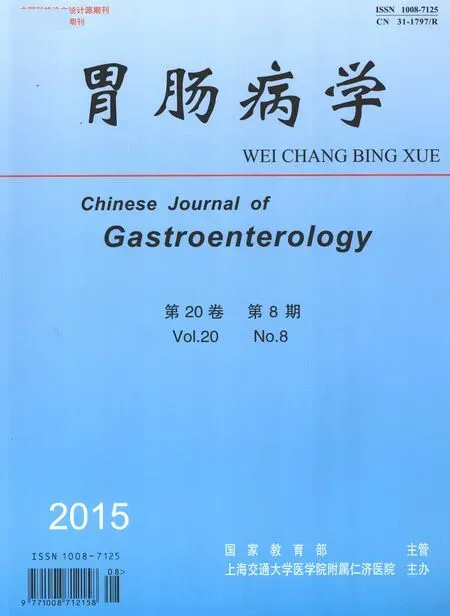抗抑郁药物治疗肠易激综合征的研究进展
姜 亚 汤玉蓉 林 琳
南京医科大学第一附属医院消化科(210029)
抗抑郁药物治疗肠易激综合征的研究进展
姜亚汤玉蓉林琳*
南京医科大学第一附属医院消化科(210029)

Therapy
肠易激综合征(IBS)是常见的功能性胃肠病之一,各国患病率为5%~20%不等,严重影响患者生活质量[1]。目前IBS的发病机制尚未明确,可能与患者存在内脏敏感性增高、中枢痛觉异常有关[2-3]。抗抑郁药物可改善IBS患者腹痛、腹部不适、精神障碍、排便异常等症状,提高患者生活质量,目前已广泛用于IBS的治疗,但其疗效的可靠性至今尚存争议。本文就抗抑郁药物治疗IBS的研究进展作一综述。
一、抗抑郁药物治疗IBS的机制
1. 抗抑郁药物的外周作用:脑-肠轴异常反射参与了IBS的病理生理过程,其神经递质包括5-羟色胺(5-HT)、去甲肾上腺素(NA)、促肾上腺皮质激素释放因子(CRF)、阿片类物质等,这些物质可改变肠道敏感性和动力[4],其中关于5-HT的研究最为广泛。5-HT主要由肠黏膜肠嗜铬细胞产生,参与胃肠道分泌、吸收、感觉和运动等功能。作用于5-HT受体的药物可缓解肠平滑肌痉挛、降低内脏敏感性、调整肠道动力,对IBS患者腹痛和肠功能均有改善[5]。
三环类抗抑郁药物(TCAs)可抑制组胺(H1)受体和毒蕈碱型受体,发挥抗胆碱能作用,从而缓解腹痛、减少肠道分泌,治疗腹泻型IBS(D-IBS)。但其不良反应显著,低剂量亦可引起口干、眼干、便秘、嗜睡、疲乏等,限制了TCAs的使用。选择性5-HT再摄取抑制剂(SSRIs)能特异性抑制5-HT再摄取,调节5-HT浓度,激活肠黏膜下神经元,促进肠道分泌,其对便秘型IBS(C-IBS)具有良好疗效。然而,Chojnacki等[6]发现,5-HT再摄取激动剂噻奈普汀同样对IBS有效,其可增加神经细胞、血小板、肠细胞等对5-HT再摄取,但不影响NA和多巴胺摄取,亦可降低下丘脑-垂体-肾上腺(HPA)轴对应激的反应,降低内脏高敏感性,缓解腹痛,减少排便频次,对D-IBS疗效显著。此外,炎性因子亦参与IBS的发病,Altschuler等[7]的研究发现,抗抑郁药物可直接或通过抗H1作用间接减少炎性因子(如肿瘤坏死因子-α、白细胞介素-6),从而调控肠黏膜炎症,缓解IBS症状。
2. 抗抑郁药物的中枢作用:IBS患者多合并精神障碍,如抑郁、焦虑、恐惧等,焦虑和紧张在IBS病程中占有主导作用[8]。人的情绪主要受大脑边缘系统控制,大脑边缘系统同时可调节内分泌和自主神经功能。脑-肠轴受自主神经系统(ANS)和HPA轴联合影响,CRF是脑-肠轴对应激反应的重要介质,抗抑郁药物在作用于大脑边缘系统、降低CRF、减少应激对HPA轴的激活、改善精神状态的同时可缓解IBS症状。
内脏高敏感性和中枢神经系统(CNS)对痛觉的异常感知在IBS发病中起着重要作用。大脑皮质前扣带回(ACC)和岛叶(IC)是内脏痛觉的中枢,其兴奋性异常影响内脏痛觉的中枢处理,导致痛觉异常,产生腹痛。研究[9]发现,IBS患者CNS感知结直肠扩张的疼痛阈值较正常人低,推测TCAs可作用于ACC和IC,通过提高中枢疼痛阈值而缓解肠道症状。Dekel等[10]指出抗抑郁药物可通过抑制突触间隙NA、5-HT再摄取发挥镇痛作用。日本一项研究[11]表明,受损脑神经元参与精神障碍的病理过程。Uzbay[12]指出,噻奈普汀能促进大脑海马神经元再生、减少细胞凋亡、加强神经元的可塑性,从而对抗焦虑和抑郁,治疗IBS。Grover等[4]指出,抗抑郁药物可减轻中枢痛感,缓解精神心理合并症,兼有止吐、提高幸福感、改善睡眠等作用。
二、抗抑郁药物对IBS症状的改善
1. 腹部症状:腹痛和腹部不适是IBS患者最常见的症状。抗抑郁药物能显著改善IBS患者腹痛或不适症状[13]。Greck等[14]的研究发现,有精神心理障碍的IBS患者接受抗抑郁药物治疗后腹痛显著缓解。Poitras等[15]的研究显示,小剂量阿米替林可降低IBS患者直肠对扩张的敏感性,缓解腹痛、腹胀。Tack等[16]采用西酞普兰对IBS患者进行交叉对照试验,结果表明与安慰剂相比,西酞普兰可显著改善腹痛等IBS症状,且不受情绪心理症状和肠道感觉运动功能的影响。Ford等[17]进行的一项系统性回顾和meta分析显示,抗抑郁药物对治疗IBS具有良好疗效,尤其在缓解腹痛或腹部不适方面。
2. 排便情况:IBS可分为D-IBS、C-IBS、混合型IBS(M-IBS)以及未定型IBS(U-IBS)四种亚型。TCAs可通过抗胆碱能作用延长口-盲肠通过时间(OCTT),缓解D-IBS患者的腹泻症状;SSRIs则通过增加肠腔5-HT浓度缩短OCTT,缓解C-IBS患者的便秘症状。Forootan等[18]对去甲替林和阿米替林治疗IBS的疗效进行研究,结果显示去甲替林和阿米替 林对改善C-IBS、D-IBS患者的排便频次均有效。Tack等[16]的研究显示,西酞普兰能改善IBS患者排便费力、排便急迫感和不尽感,但对排便频次影响不大。
3. 精神障碍:Drossman等[19]的研究发现,抑郁和焦虑等情绪可加重IBS患者肠道不适,地昔帕明对有精神心理障碍的IBS患者疗效更好。Ladabaum等[20]的研究亦证实,西酞普兰对有精神合并症的IBS患者效果显著,但对无精神心理异常的患者疗效近似于安慰剂。然而,Mercier等[21]提出,抗抑郁药物对精神正常的IBS患者亦大有益处。躯体和精神疾患相互影响,很难将两者截然分开,因此治疗难治性IBS患者时,改善其精神状态有助于缓解躯体症状。有研究[22-23]表明,TCAs治疗IBS的剂量远小于抗抑郁的剂量,推测其不通过抗抑郁作用缓解IBS症状,但SSRIs治疗IBS的剂量与抗抑郁的剂量无明显差异,尚不明确其是否通过抗抑郁作用间接治疗IBS。
4. 生活质量:Bahar等[24]对青少年IBS患者使用阿米替林进行研究,发现阿米替林可提高患者的总体生活质量。Baki等[23]研究发现,丙咪嗪可缓解IBS患者全身症状,提高生活质量。Andrew等[25]指出,使用帕罗西汀可提高患者总体幸福感,但对IBS相关症状和社会功能无明显改善。
三、抗抑郁药物治疗IBS的应用现状
抗抑郁药物与调节肠道功能药物联合应用可缓解IBS患者精神和躯体症状,但因各项研究的疗效评价不尽相同,故结论有待进一步证实。美国胃肠病学会(ACG)提出,对传统药物疗效不佳的IBS患者,TCAs和SSRIs在缓解腹痛、改善全身状况方面均优于安慰剂[26]。Rahimi等[27]指出,TCAs对控制IBS症状有明显效果,但该药存在较多不良反应,主要用于中重度IBS患者;推荐以抗胆碱能作用较轻的TCAs(如多塞平、地昔帕明等)治疗老年或C-IBS患者;推荐以丙咪嗪、阿米替林治疗失眠或D-IBS患者。中华医学会消化病学分会胃肠动力学组[28]指出,对腹痛症状严重而传统用药治疗无效,尤其伴有较明显精神症状的IBS患者可试用抗抑郁药物治疗。
目前,抗抑郁药物治疗IBS的具体剂量与疗程尚未统一,但普遍认为小剂量TCAs(相比于抗抑郁剂量)和足量的SSRIs可部分缓解IBS症状,提高患者的生活质量。多项研究[13,23,27]显示,TCAs 10~50 mg睡前口服、初始小剂量,使用8~12周后,IBS患者腹部症状以及精神状态有所改善,疗程中可根据患者对药物的应答适当加量。一项SSRIs治疗IBS的系统性回顾[25]指出,早餐前口服SSRIs 20~40 mg,使用6~12周后,患者的腹部症状、粪便性状或(和)综合感觉有不同程度的改善。Chojnacki等[6]的研究显示,噻奈普汀12.5 mg tid口服8周,可明显缓解C-IBS和D-IBS患者的躯体和精神症状。
四、展望
综上所述,对于传统治疗方案不理想或难治性IBS患者,可考虑应用抗抑郁药物治疗。但目前仍存在部分问题有待探讨:①探讨抗抑郁药物在IBS中的作用机制;②统一抗抑郁药物缓解IBS症状的评价标准;③研究抗抑郁药物对不同亚型或有无精神合并症的IBS患者的疗效;④探讨如何个体化选用抗抑郁药物,制定最佳剂量和疗程;⑤明确抗抑郁药物联合心理治疗能否更好地缓解IBS症状。
参考文献
1 Lovel RM,Ford AC.Global prevalence of and risk factors for irritable bowel syndrome: a meta-analysis[J].Clin Gastroenterol Hepatol, 2012, 10 (7): 712-721.
2 Tillisch K, Mayer EA, Labus JS. Quantitative meta-analysis identifies brain regions activated during rectal distension in irritable bowel syndrome[J]. Gastroenterology, 2011, 140 (1): 91-100.
3 Konturek PC, Brzozowski T, Konturek SJ. Stress and the gut: pathophysiology, clinical consequences, diagnostic approach and treatment options[J]. J Physiol Pharmacol, 2011, 62 (6): 591-599.
4 Grover M, Drossman DA. Centrally acting therapies for irritable bowel syndrome[J]. Gastroenterol Clin North Am, 2011, 40 (1): 183-206.
5 Lazaraki G, Chatzimavroudis G, Katsinelos P. Recent advances in pharmacological treatment of irritable bowel syndrome[J]. World J Gastroenterol, 2014, 20(27):8867-8885.
6 Chojnacki C, Walecka-Kapica E, Mokwinska M, et al. Influence of tianeptine on melatonin homeostasis and psychosomatic symptoms in patients with irritable bowel syndrome[J]. J Physiol Pharmacol, 2013, 64 (2): 177-183.
7 Altschuler EL, Kast RE. Using histamine (H1) antagonists, in particular atypical antipsychotics, to treat anemia of chronic disease via interleukin-6 suppression[J]. Med Hypotheses, 2005, 65 (1): 65-67.
8 Chang L. The role of stress on physiologic responses and clinical symptoms in irritable bowel syndrome[J]. Gastroenterology, 2011, 140 (3): 761-765.
9 Chao GQ, Zhang S. A meta-analysis of the therapeutic effects of amitriptyline for treating irritable bowel syndrome[J]. Intern Med, 2013, 52 (4): 419-424.
10Dekel R,Drossman DA, Sperber AD. The use of psychotropic drugs in irritable bowel syndrome[J]. Expert Opin Investig Drugs, 2013, 22 (3): 329-339.
11Omata N, Mizuno T, Mitsuya H, et al. Multiaxial evaluation of the pathophysiology of mood disorder and therapeutic mechanisms of clinical drugs by neuronal plasticity and neuronal load[J].Nihon Shinkei Seishin Yakurigaku Zasshi, 2013, 33 (5-6): 231-236.
12Uzbay TI. Tianeptine: potential influences on neuroplasticity and novel pharmacological effects[J].Prog Neuropsychopharmacol Biol Psychiatry, 2008, 32 (4): 915-924.
13Ghadir MR , Habibinejad H , Heidari A, et al. Doxepin is more effective than nortriptyline and placebo for the treatment of diarrhea-predominant irritable bowel syndrome: a randomized triple-blind placebo-controlled trial[J]. Tehran Univ Med J, 2011, 69 (6): 352-358.
14Greck M, Layer P, Andresen V.Pain therapy in irritable bowel syndrome[J].Schmerz, 2014, 28 (3): 289-293.
15Poitras P, Poitras MR, Plourde V, et al. Evolution of visceral sensitivity in patients with irritable bowel syndrome[J].Dig Dis Sci, 2002, 47 (4): 914-920.
16Tack J, Broekaert D, Fischler B, et al. A controlled crossover study of the selective serotonin reuptake inhibitor citalopram in irritable bowel syndrome[J]. Gut, 2006, 55 (8): 1095-1103.
17Ford AC, Quigley EM, Lacy BE, et al. Effect of antidepressants and psychological therapies, including hypnotherapy, in irritable bowel syndrome: systematic review and meta-analysis[J]. Am J Gastroenterol, 2014,109 (9): 1350-1365.
18Forootan H, Taheri A, Hooshangi H, et al. Effects of fluoxetine, nortriptyline and amitriptyline in IBS patients[J]. Feyz Kashan Univ Med Sci Health Serv, 2002, 6 (1): 49-55.
19Drossman DA, Toner BB, Whitehead WE, et al. Cognitive-behavioral therapy versus education and desipramine versus placebo for moderate to severe functional bowel disorders[J]. Gastroenterology, 2003, 125 (1): 19-31.
20Ladabaum U, Sharabidze A, Levin TR, et al.Citalopram provides little or no benefit in nondepressed patients with irritable bowel syndrome[J].Clin Gastroenterol Hepatol, 2010, 8 (1): 42-48.
21Mercier A, Augar-Aubin I, Lebeau JP, et al.Evidence of prescription of antidepressants for non-psychiatric conditions in primary care: an analysis of guidelines and systematic reviews[J]. BMC Fam Pract, 2013, 14: 55.
22Teitelbaum JE, Arora R. Long-term efficacy of low-dose tricyclic antidepressants for children with functional gastrointestinal disorders[J].J Pediatr Gastroenterol Nutr, 2011, 53 (3): 260-264.
23Baki HA, Hajj IE, Elzahabi L, et al. A randomized controlled trial of imipramine in patients with irritable bowel syndrome[J].World J Gastroenterol, 2009, 15 (29): 3636-3642.
24Bahar RJ, Collins BS, Steinmetz B, et al. Double-blind placebo-controlled trial of amitriptyline for the treatment of irritable bowel syndrome in adolescents[J].J Pediatr, 2008, 152 (5): 685-689.
25Bundeff AW, Woodis CB. Selective serotonin reuptake inhibitors for the treatment of irritable bowel syndrome[J].Ann Pharmacother, 2014, 48 (6): 777-784.
26American College of Gastroenterology Task Force on Irritable Bowel Syndrome; Brandt LJ, Chey WD, Foxx-Orenstein AE, et al. An evidence-based position statement on the management of irritable bowel syndrome[J]. Am J Gastroenterol, 2009, 104 Suppl 1: S1-S35.
27Rahimi R, Nikfar S, Rezaie A, et al. Efficacy of tricyclic antidepressants in irritable bowel syndrome: A meta-analysis[J].World J Gastroenterol, 2009,15 (13): 1548-1553.
28中华医学会消化病学分会胃肠动力学组.肠易激综合征诊断和治疗的共识意见(2007,长沙)[J].中华消化杂志, 2008, 28 (1): 38-40.
(2015-01-03收稿;2015-02-27修回)
摘要肠易激综合征(IBS)是常见的功能性胃肠病之一,严重影响患者生活质量。目前IBS的发病机制尚未明确,内脏敏感性增高、中枢痛觉异常可能参与发病过程。抗抑郁药物可改善IBS患者腹痛、腹部不适、精神障碍、排便异常,提高患者生活质量。本文就抗抑郁药物治疗IBS的研究进展作一综述。
关键词肠易激综合征;抗抑郁药,三环;选择性5-羟色胺再摄取抑制剂;治疗
Advances in Study on Antidepressants in Treatment of Irritable Bowel SyndromeJIANGYa,TANGYurong,LINLin.DepartmentofGastroenterology,theFirstAffiliatedHospitalwithNanjingMedicalUniversity,Nanjing(210029)
Correspondence to: LIN Lin, Email: lin9100@aliyun.com
AbstractIrritable bowel syndrome (IBS) is one of the most common functional gastrointestinal disorders, which severely affects the life quality of patients.Currently, the pathogenesis of IBS has not yet been clarified. Visceral hypersensitivity and central algesia abnormality may be involved in the pathogenesis of IBS. Antidepressants can improve abdominal pain, abdominal discomfort, mental disorders and abnormal defecation and enhance the quality of life. This article reviewed the advances in study on antidepressants in treatment of IBS.
Key wordsIrritable Bowel Syndrome;Antidepressive Agents, Tricyclic;Selective Serotonin Reuptake Inhibitors;
通信作者*本文,Email: lin9100@aliyun.com
DOI:10.3969/j.issn.1008-7125.2015.08.014

